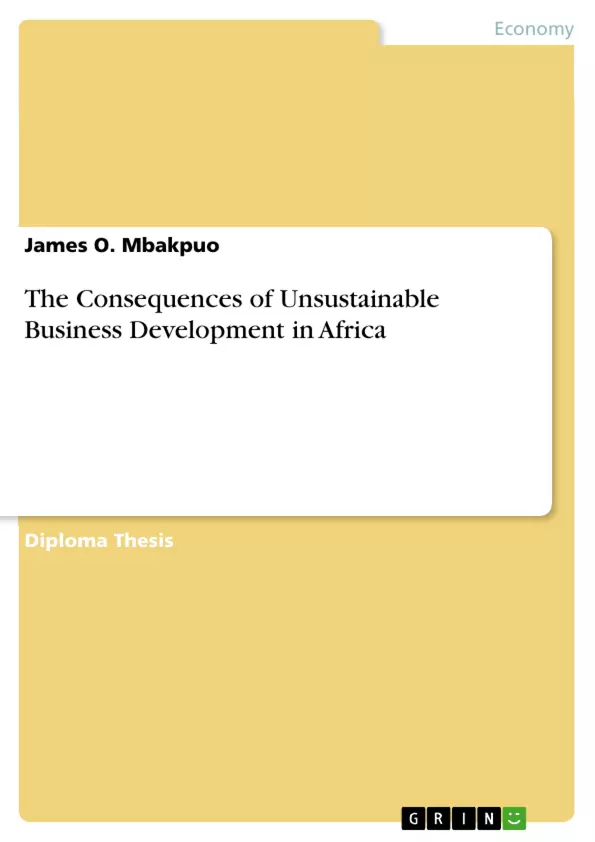There is therefore an urgent need to critically re-examine the development strategies that have been pursued in Africa and to adopt approaches that have a real potential to put Africa on the road to sustainable development (SD). This research reviews the challenges facing Africa in its determination to achieve SD in the new millennium and in the age of sustainable development.
To set the background for an objective discussion on sustainable business development process in Africa, a number of principal business and environmental initiatives, conventions and programs adopted by the continent are first briefly reviewed. Finally, directions for future research aimed at transforming unsustainably dominant business practices and development in Africa are provided.
Despite the fact that Africa is relatively rich in natural resources, development strategies pursued in the continent have not always been in harmony with the objective of ensuring decent living conditions for the population and maintaining a high level of environmental quality. Over the past five decades of political independence, most African countries have witnessed serious socio-economic and environmental crises. For example, rapid population growth and man-made and natural disasters have seriously bruised the quality of Africa’s business environment and the life of its population. The environmental business crisis facing Africa is a real threat to the very existence of the continent: Corruption, poor infrastructural development, low or poor government speeding, Low quality standards of goods and services, high cost of doing business due to lack of constant electric power supply, famine, starvation, floods, epidemic diseases, deforestation, desertification, and unmanageable mountains of waste are common environmental problems in most African countries. About two-thirds of Sub-Saharan Africa’s (SSA) agricultural lands are already seriously degraded. In the social realm, there is a big gap between economic and social well-being.
Inhaltsverzeichnis (Table of Contents)
- Acknowledgment
- ABSTRACT
- CHAPTER ONE
- 1.1 INTRODUCTION
- 1.2 LITERATURE REVIEW
- 1.3 HISTORY OF SUSTAINABLE DEVELOPMENT
- 1.4 RELATIONSHIPS AMONG THE ENVIRONMENT, ECONOMY AND SOCIETY
- 1.5 THE SUSTAINABLE DEVELOPMENT GOALS
- 1.6 RESEARCH QUESTIONS
- 1.7 SIGNIFICANCE OF THE STUDY
- 1.8 RESEARCH METHODOLOGY
- 1.9 RESEARCH OBJECTIVE
- CHAPTER TWO
- 2.1 UNSUSTAINABLE BUSINESS PRACTICES IN AFRICA
- 2.2 UNSUSTAINABLE BUSINESS PRACTICES IN AFRICA BY SECTORS AND THEIR CONSEQUENCES
- CHAPTER THREE
- 3.1 CHALLENGES TO SUSTAINABLE DEVELOPMENT IN AFRICA
- 3.2 PROSPECTS OF SUSTAINABLE DEVELOPMENT IN AFRICA
- REFERENCES
Zielsetzung und Themenschwerpunkte (Objectives and Key Themes)
This research aims to critically examine the development strategies pursued in Africa and identify approaches that can help the continent achieve sustainable development. It analyzes the challenges facing African countries in their quest for sustainable development and explores the potential of sustainable business practices as a catalyst for positive change.
- Challenges to Sustainable Development in Africa
- Unsustainable Business Practices in Africa
- The Role of Sustainable Development Goals (SDGs) in Africa
- The Interconnectedness of Social, Economic, and Environmental Sustainability
- The Importance of a Triple Helix Approach for Sustainable Knowledge Economies
Zusammenfassung der Kapitel (Chapter Summaries)
- Chapter One introduces the concept of sustainable development and its historical context, exploring the relationship between environmental, economic, and social factors. It also introduces the Sustainable Development Goals (SDGs) and their significance for Africa. The chapter concludes by outlining the research questions, objectives, and methodology employed in the study.
- Chapter Two delves into the issue of unsustainable business practices in Africa, examining their prevalence across different sectors and their detrimental consequences. It discusses the negative impacts of these practices on the environment, economy, and society, highlighting the urgent need for a shift towards sustainable business models.
- Chapter Three explores the challenges facing Africa in its pursuit of sustainable development. The chapter analyzes factors that hinder progress, including poverty, corruption, lack of infrastructure, and the impact of extractive industries. It also examines the potential prospects for sustainable development in Africa, highlighting opportunities for innovation, investment, and collaboration.
Schlüsselwörter (Keywords)
The research focuses on key themes related to sustainable business development in Africa, including unsustainable business practices, environmental degradation, social inequality, economic growth, the Sustainable Development Goals (SDGs), the triple helix model, and the impact of extractive industries. These concepts highlight the complex challenges and opportunities facing African countries in their efforts to achieve sustainable development.
Frequently Asked Questions
What are the main challenges for sustainable development in Africa?
Key challenges include corruption, poor infrastructure, rapid population growth, environmental degradation, and the negative impact of extractive industries.
How do unsustainable business practices affect Africa?
They lead to socio-economic crises, deforestation, desertification, and a significant gap between economic growth and social well-being.
What is the "Triple Helix Approach"?
It refers to the collaboration between government, industry, and academia to foster a sustainable knowledge economy.
Are natural resources enough for Africa's development?
No; although Africa is rich in resources, past strategies have failed to ensure decent living conditions or maintain environmental quality.
What role do the Sustainable Development Goals (SDGs) play?
The SDGs provide a framework to realign Africa's development strategies towards environmental, economic, and social sustainability in the new millennium.
- Quote paper
- Dr. James O. Mbakpuo (Author), 2022, The Consequences of Unsustainable Business Development in Africa, Munich, GRIN Verlag, https://www.grin.com/document/1246492



